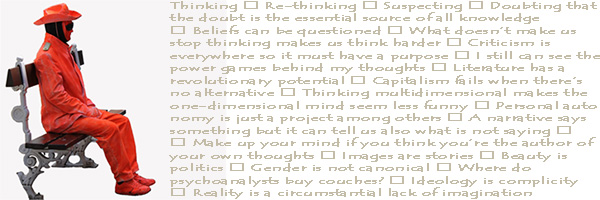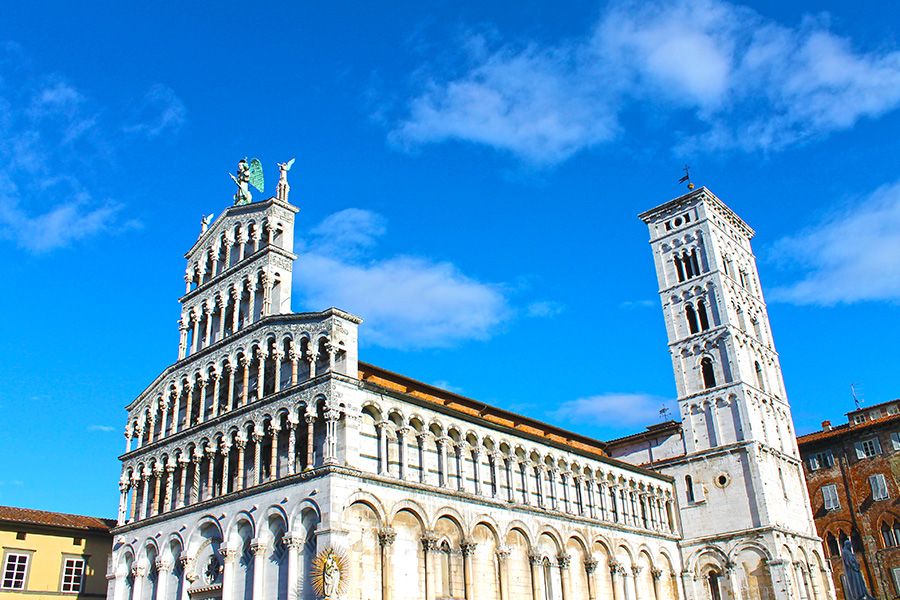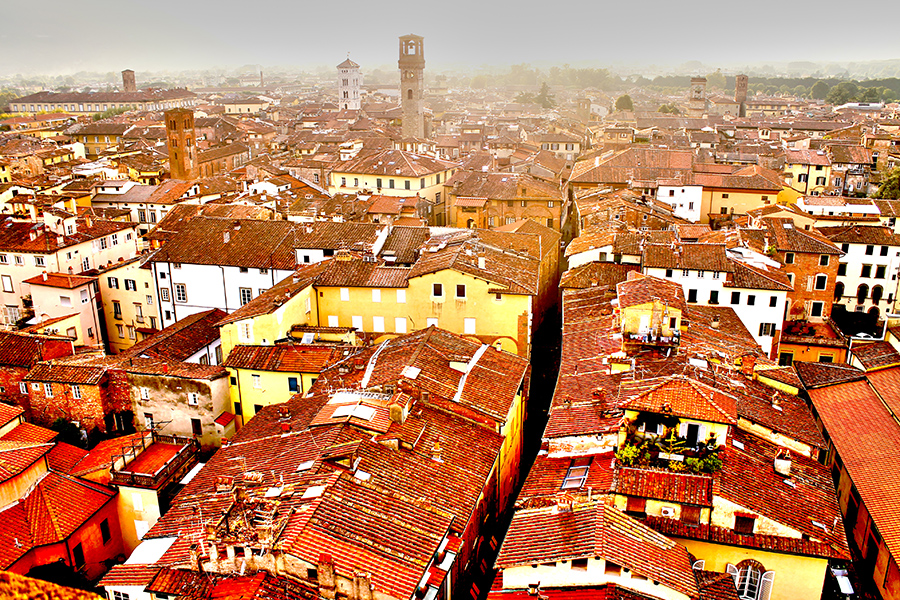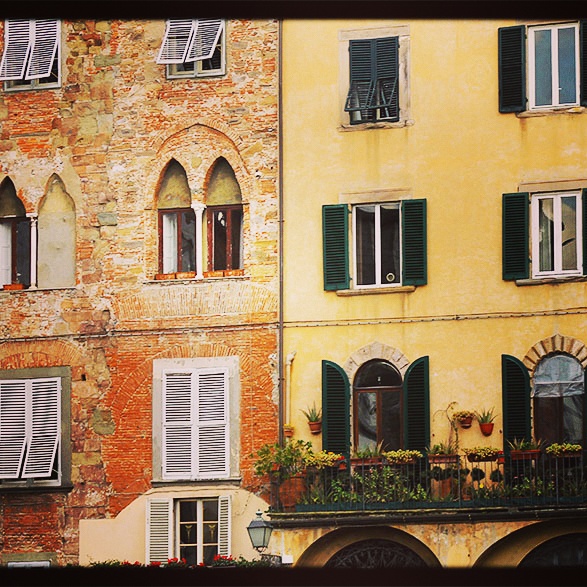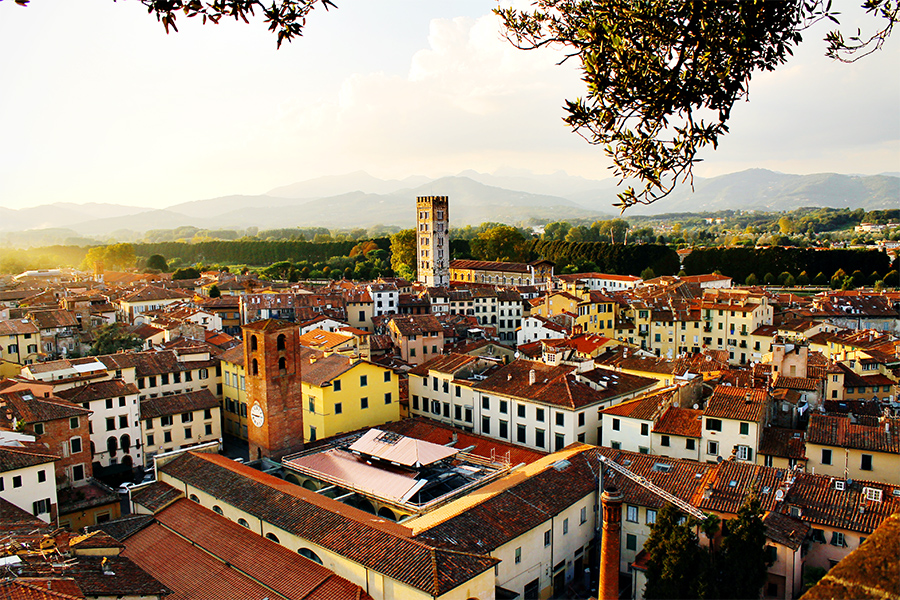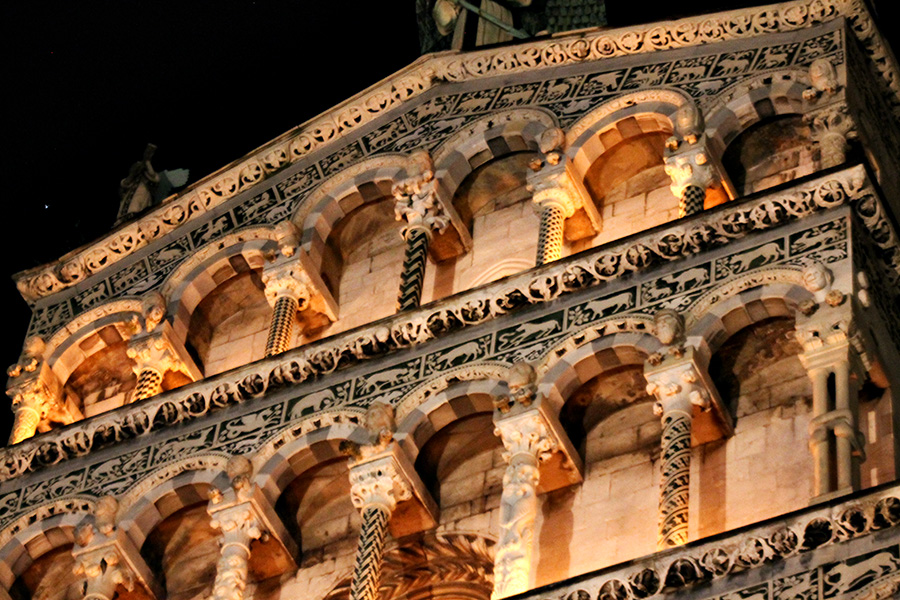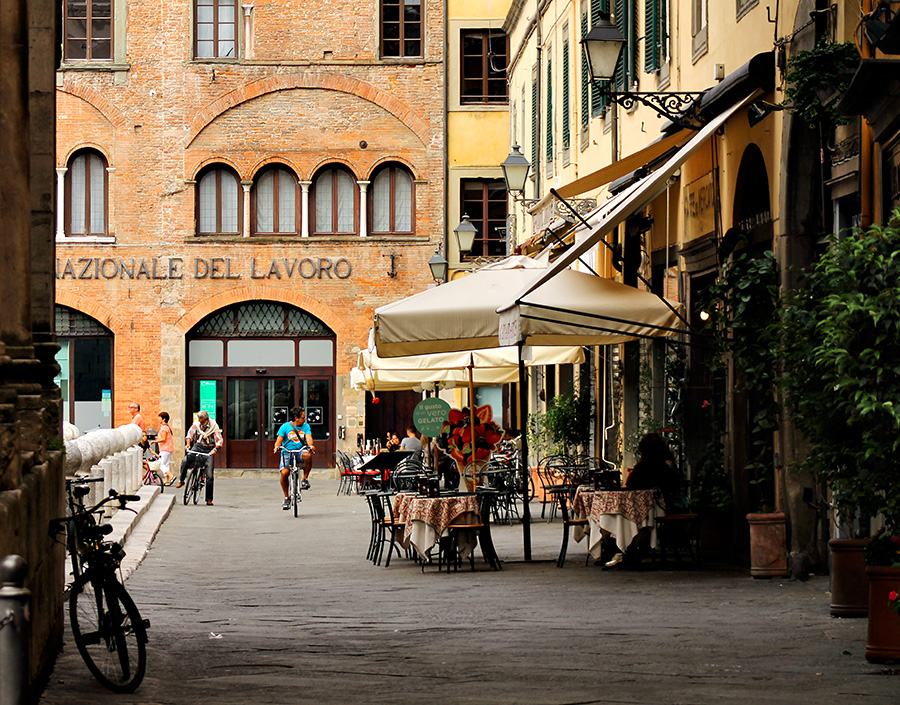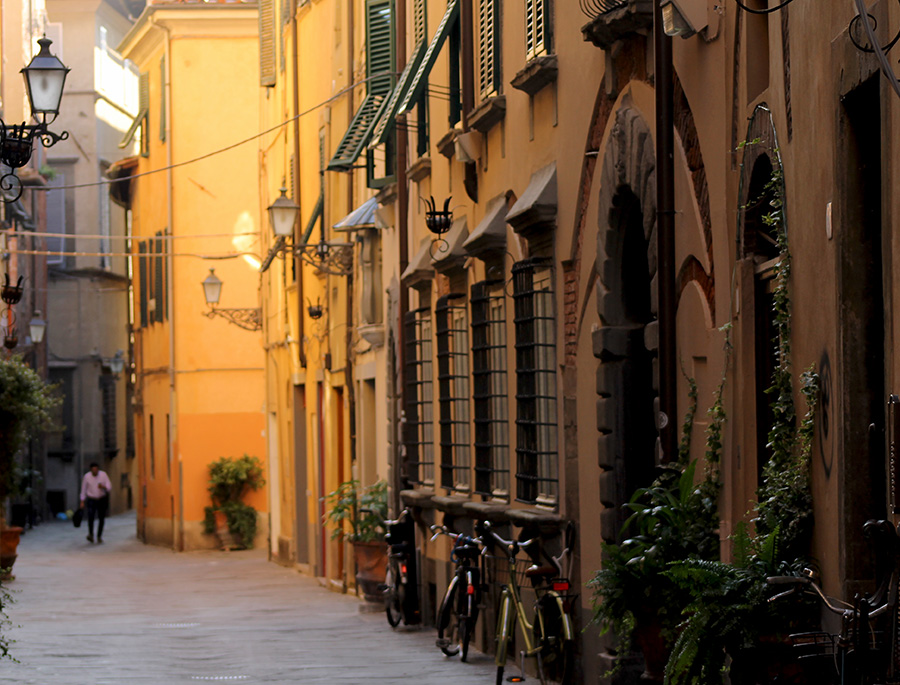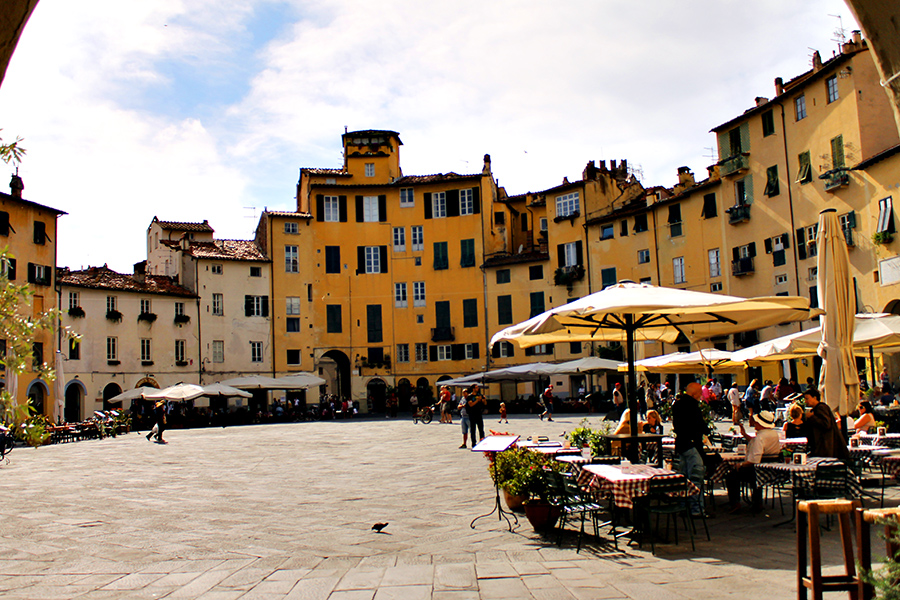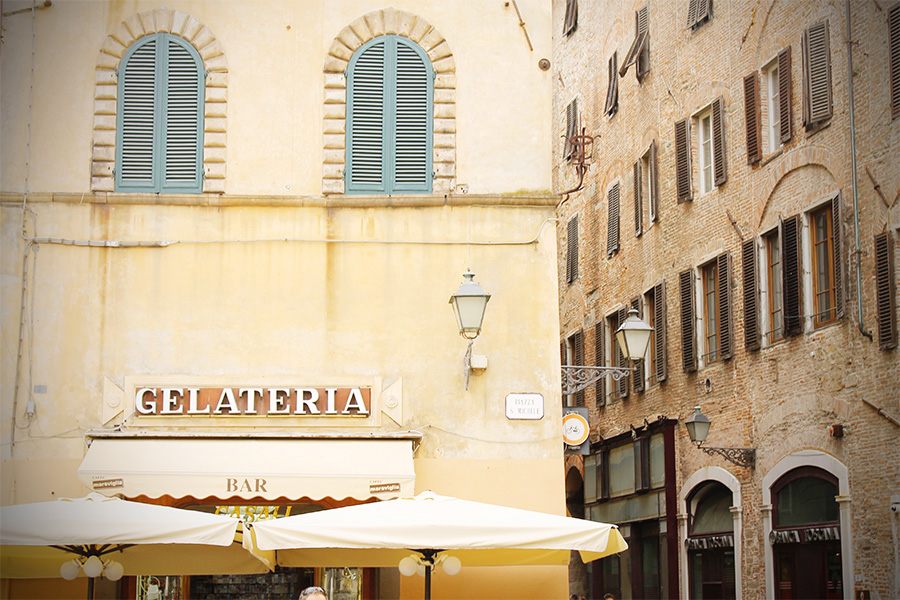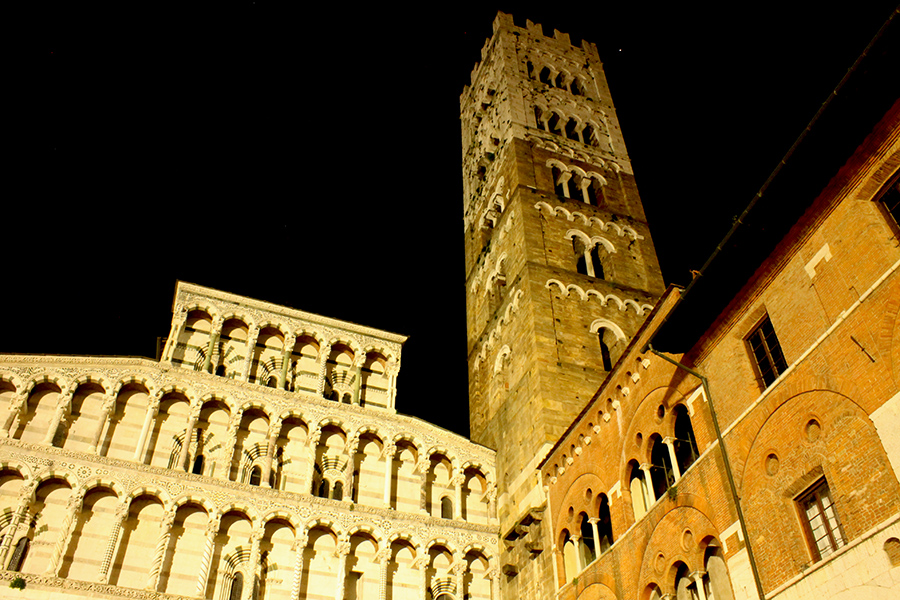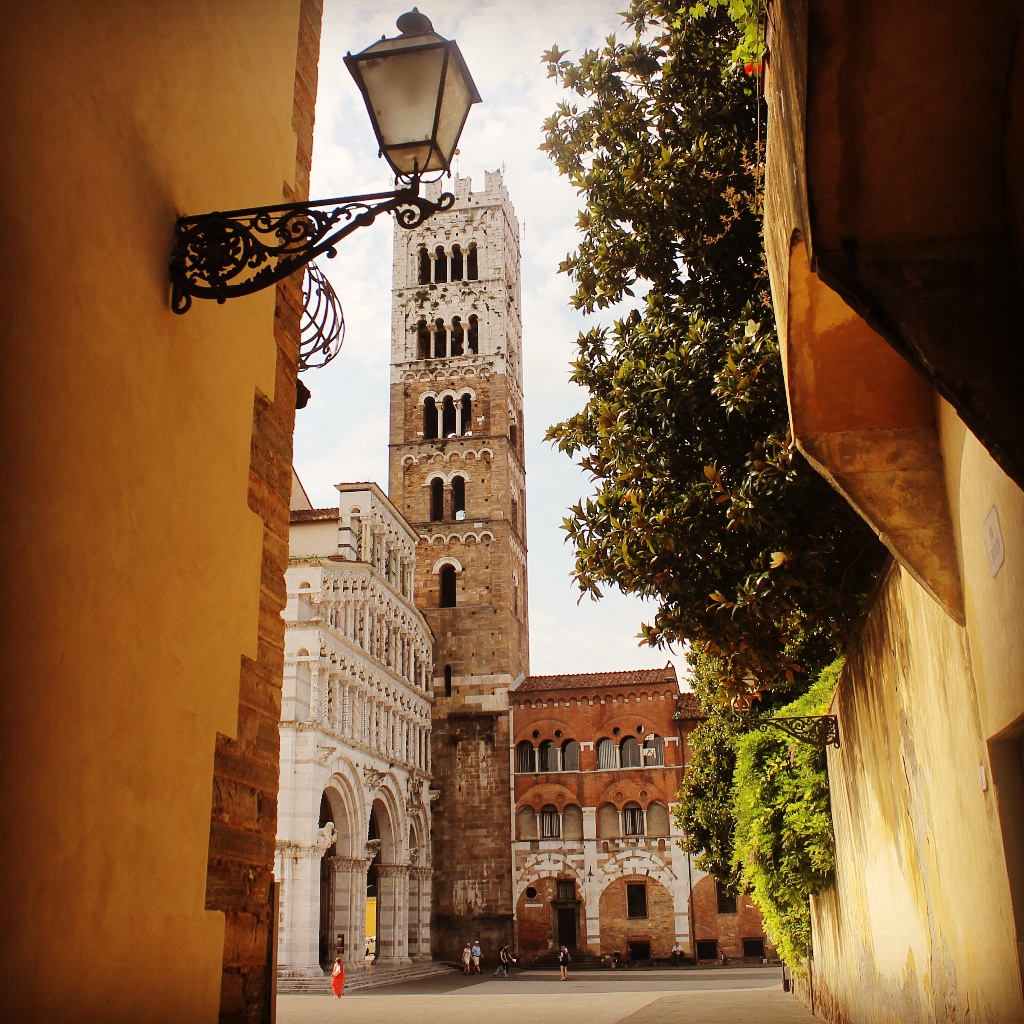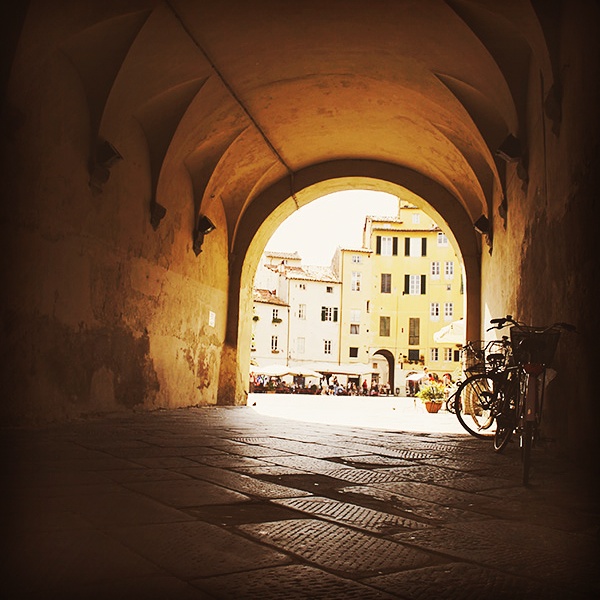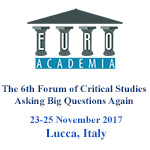Auditorium – Agora Cultural Centre
Via delle Trombe, 6 (Piazza dei Servi, Centro Storico) 55100 Lucca Tuscany, ItalyConference Agenda
- November 23, 2017
- 09:00 - 09:30Participants Registration (Registration Desk)
- 09:30 - 10:30Welcome and Opening Remarks - Open Floor Workshop: Critical Times: Call for Critical Thinking and Asking Big Questions Again
- 10:30 - 11:00Coffee Break (Café Fellini)
- 11:00 - 13:00Panel 1: Asking Big Questions Again: Bridging the Gap Between Critical Theory, Culture, Politics and Social Praxis
- 13:00 - 14:30Tuscan Specialties Lunch – Restaurant
- 14:30 - 16:30Panel 2: Performing Identities: Performativity of the Body, Gender, and Sexuality and the Relationship between Identity and Performance in Performing Arts, Literature, and Social Narratives
- 16:30 - 17:00Coffee Break (Café Fellini)
- 17:00 - 19:00Panel 3: Thinking Contemporary Culture and Education: Post-Truth, Multiculturalism, Relativism, Difference and Models of Youth Education and Integration in Contemporary Societies
- 19:00 - 19:45Welcome Drink – Aperitivo in Lucca
- 19:45 - 21:00Optional Social Tuscan Dinner Out in Lucca
- November 24, 2017
- 09:30 - 11:00Panel 4: Art, History, Cultural Diplomacy and Critical Assessments of Politicized Representations of Identity in Arts
- 11:00 - 11:30Coffee Break (Café Fellini)
- 11:30 - 13:30Panel 5: The Eurozone Crisis: Transformative Impact on the European Project and Model(s) of Capitalism
- 13:30 - 15:00Tuscan Specialties Lunch – Restaurant
- 15:00 - 17:00Panel 6: Identity and the City: Urban Transformations, Transition and Change in Urban Image Construction (Section 1)
- 17:00 - 17:30Coffee Break (Café Fellini)
- 17:30 - 19:30Panel 7: Critical Contemporary Economics and Politics: From Local to Domestic and International Dimensions
- 19:30 - 21:00Optional Social Tuscan Dinner Out in Lucca
- November 25, 2017
- 09:30 - 11:00Panel 8: The Sequential Arts: Comics as Critical Cultural Ne
- 11:00 - 11:30Coffee Break (Café Fellini)
- 11:30 - 13:00Panel 9: Identity and the City: Urban Transformations, Transition and Change in Urban Image Construction (Section 2)
- 13:00 - 13:30Closing Session: Closing Discussion and Final Remarks
- 13:30 - 14:30Optional Pizza Lunch Out in Lucca
- 14:30 - 16:00Optional Walking Tour of Lucca
- November 23, 2017
6th Forum of Critical Studies: Asking Big Questions Again
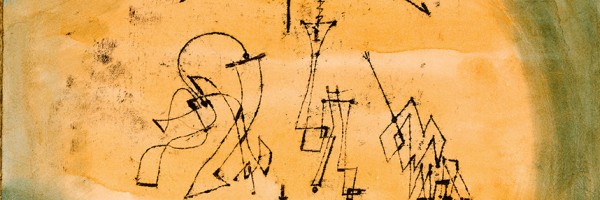
- Conference Description
- Participant’s Profile
- Registration and Fee
- Social Activities and Publication
- Important Dates
- Venue and Directions
- Conference Program
- Panel 1
- Panel 2
- Panel 3
- Panel 4
- Panel 5
- Panel 6
- Panel 7
- Panel 8
- Panel 9
The 6th Euroacademia
Global Forum of Critical Studies
Asking Big Questions Again
Pre-Festival Edition
23 – 25 November 2017
Agora Cultural Centre
Lucca, Tuscany, Italy
Conference Description:
Some say that the 21st Century or modernity altogether made humans more concerned with doing rather than being. As the classical Greek civilization valued most the reflexive thinking as a form of freedom from natural necessities, contemporary times profoundly involve individuals and the imaginary accompanying social practices in a restless logic of consumption, competition and engagement that profoundly – or some would say, radically – suspends or indefinitely postpones the autonomous capacity of human beings to question and reflect upon the social order and the meaning of social practices. The fast advancement of a peculiar logic of post-industrial societies, the gradual dissolution of alternative models to the capitalist logic and a multitude of other alerting factors pushed ahead a global spread culture of one-dimensional productions of meaning that advances a closure rather than a constant reflexive re-evaluation of cultural and social practices.
Many alternatives at hand are often condemned to marginality or lost in the quasi-plural practices where everything goes as long as it’s part of an intellectual market. The ‘fatal strategies’ of post-industrial societies to keep individuals captive, busy and seduced by contingent social arrangements and economic practices minimized the questioning detachment required to evaluate and give meaning through reflexive criticism and unlimited interrogation. Various labels were given to our unfolding times from apocalyptic ones to some more comforting yet, not by chance, lacking some vital optimism. Despite a wide-spread discontent and suspicion towards daily realities of our current societies, most of big questions are often left outside by the self-involved active pursuit of an imagined well-being that is no longer transgressed by harsh critical evaluation of its meaning. The academic arena itself also advances, supports, integrates and promotes limited particular methodologies that generate an effect of mainstreaming and often keeps researchers or practitioners out of the battle-ground for big questions.
The ongoing economic crisis made reality even harsher and pushed ahead the need for more thinking as many habitual categories lost their meaning or relevance. New ways of thinking could transgress some inappropriate conceptions or misconceptions that preserve their centrality due to the mechanics of habit. This is a time when a call to thinking is well-placed. This is a call to arms for critical studies that promotes alternative, questioning and multidimensional thinking. It is based on the belief that thinking more is asking more and the answers come from creative constructive reasoning if left unbiased.
The 6th Euroacademia Global Forum of Critical Studies aims to bring into an open floor the reflexive and questioning interaction among academics, intellectuals, practitioners, artists and activists profoundly concerned with evaluative understandings of the world we’re living in. The focus of the forum is to initiate an arena where no question is misplaced and irrelevant as long as we acknowledge that evaluation, critical thinking and contestation are accessible trajectories to better understand our past, present and alternative scenarios for the future. The Forum is also an open stage for sharing existing or ready formed intellectual visions and expose them to dialogue and scrutiny in a critically reflective environment. The 6th edition of the forum is the last edition to be replaced and followed from 2018 by the yearly Festival of Critical Studies to be held in Lucca. The Festival aims to become a creative meeting point for all the critical studies perspectives coming from intellectuals, academics, performing artists, change makers and idea shapers.
Participant’s Profile
The conference is addressed to academics, intellectuals, researchers, artists,performing artists,professionals / practitioners and activists profoundly concerned with evaluative understandings of the world we’re living in. The conference aims to stimulate critical reflection and therefore intellectual exercises in critical thinking beyond professional and disciplinary boundaries are given preference and strongly welcomed. As the nature of the conference is intended to be multidisciplinary in nature and critically dialogical in practice, different academic backgrounds and levels are equally welcomed.
Post-graduate students, doctoral candidates and young researchers are welcomed to submit an abstract. Representatives of INGOs, NGOs, Think Tanks and activists willing to present their work, research, experiences or reflections are welcomed as well to submit the abstract of their contribution. Euroacademia does not promote the ‘byzantine’ association of people with their institutions. As well the distinction between senior and junior researchers is not applied as a cleavage.
Session proposals and abstracts will be reviewed by the Selection Committee and the participants are selected based on the proven quality of the abstract and the capacity to contribute to stimulating intellectual dialogue. A critical studies stand-point is required in the selection. The submitted paper for the conference proceedings is expected to be in accordance with the lines provided in the submitted abstract.
Registration and Fee
The Registrations Process Is Closed
The Participation Fee Includes:
- the registration fee
- official invitation for the event
- participant’s package with all the materials for the conference
- full access to all sessions of the event
- eligibility for publishing of the presentation in the conference volume
- a copy of the electronic volume
- access to Euroacademia discussion group and newsletters
- daily coffee brakes
- Tuscan wineaperitivo with snacks on 23rd of November 2017
- a 3 course Tuscan specialties lunch on 23rd of November 2017
- a 3 course Tuscan specialties lunch on 24th of November 2017
- certificate of attendance
- access to optional social program
- an optional guided walking tour of Lucca on Saturday 25th of November 2017
Unfortunately, Euroacademia has no available funds for covering transport and accommodation to/in Lucca. Participants are responsible for securing funding from their institutes of affiliation to cover transportation and accommodation costs during the whole period of the conference. Official invitation letters can be sent by Euroacademia to the financing institution to confirm the selection and participation in the conference upon request.
Social Activities and Publication
A specific spot in the conference program will be dedicated to social networking and therefore all the participants interested in setting or developing further cooperation agendas and prospects with other participants will have time to present and/or promote their project and express calls for cooperation.
Photos and videos will be taken during the conference and the organizers will consider through the participation of selected presenters or members of the audience that the agreement for being photographed or filmed during the event was granted through registration to the event. Please notify the organizers in written form prior to the the event if you are a confirmed participant and would prefer otherwise.
A specific setting (Social Corner) for promotional materials connected with the topic of the conference will be reserved for the use of the participants. Books authored or edited by the participants can be exhibited and promoted during the whole period of the conference and can also be presented within the conference package based on prior arrangements.
An optional dinner and as social event will be organized for the three days of the conference in typical Italian cuisine restaurants as optional program for the willing participants. The social dinner will be held based on participant’s prior confirmation and it will require costs to be covered by the participants individually on-site at the restaurant.
Publication:
Selected papers will be published in an electronic volume with ISBN after the confirmation of the authors and a double peer-review process based on an agreed publication schedule. All the papers selected for publication should be original and must have not been priory published elsewhere. All participants to the conference will receive a copy of the volume.
| Important Dates & Deadlines | |
|---|---|
| 10th of October 2017 | Extended Deadline for Submitting Paper Proposals |
| 11th of October 2017 | Latest notification of acceptance for papers received under the extended deadline |
| 16th of October 2017 | Registration under extended deadline |
| 25th of October 2017 | Sending the draft paper to be uploaded on the web site of the conference |
| 10th of November 2017 | Publication of the conference program and uploading the draft papers on the website |
| 23rd of November 2017 | The conference commences |
Venue and Directions
The main proceedings of the conference will take place in the Auditorium of the Cultural Centre Agora in Lucca. The Auditorium is part of the Convento dei Padri Serviti built around 1300 by the order of Servi di Maria.The Auditorium is the restructured space of the Oratory of S. Lorenzo, built in 1480, but whose structure and interior was renovated without changes or interventions. The space above the area of the former altar includes a fresco of Guidotti, painter from 1600, that represents the miracle of San Silao. Eventual additional events to the proceedings may take place in other specific rooms of the Agora Culutral Center and in the XVIth century Palazzo Bernardini. The location is centrally located in the heart of Lucca, few steps away from the San Martino Cathedral of Lucca, Piazza San Michele with its beautiful San Michele in Foro church and the renaissance walls that surround the historical city, making easily accessible within a walking distance any part of its amazing Middle Ages or Renaissance treasures. Via delle Trombe, 6 (Piazza dei Servi, Centro Storico) Lucca is one of the most beautiful cities of Tuscany, a treasure of beauty, culture and history, preserving exquisitely the signs of past kingdoms and dominions, the beauty of nature and the works of many renown architects and artists. Dante spent a part of his exile in Lucca. Located between Florence and Pisa, Lucca is the home town of Giacomo Puccini and Luigi Boccherini. Is a town where each of the streets has a story to tell. The city walls are the best preserved Renaissance walls in the world, offering the opportunity of a relaxing and enchanting ‘passeggiata’ (promenade) or a bike ride with amazing views over the surroundings. Piazza Napoleone -one of the main squares – was built in the time of Napoleonic conquest when the city was led by Napoleon’s sister Elisa Bonaparte. It is rivaled in beauty by Piazza del Amfiteatro, built to maintain the shape of the Roman Amphitheater built during the I and II centuries that could accommodate over 10,000 spectators. A city of 100 churches, Lucca is labyrinth of small streets that hide secrets to be discovered.
Agora Cultural Centre
55100 Lucca Tuscany, Italy
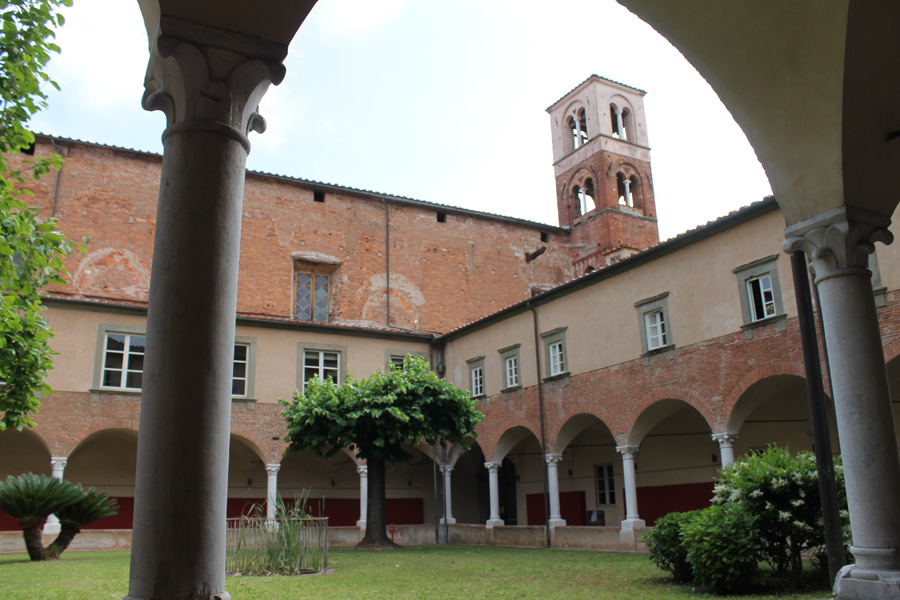
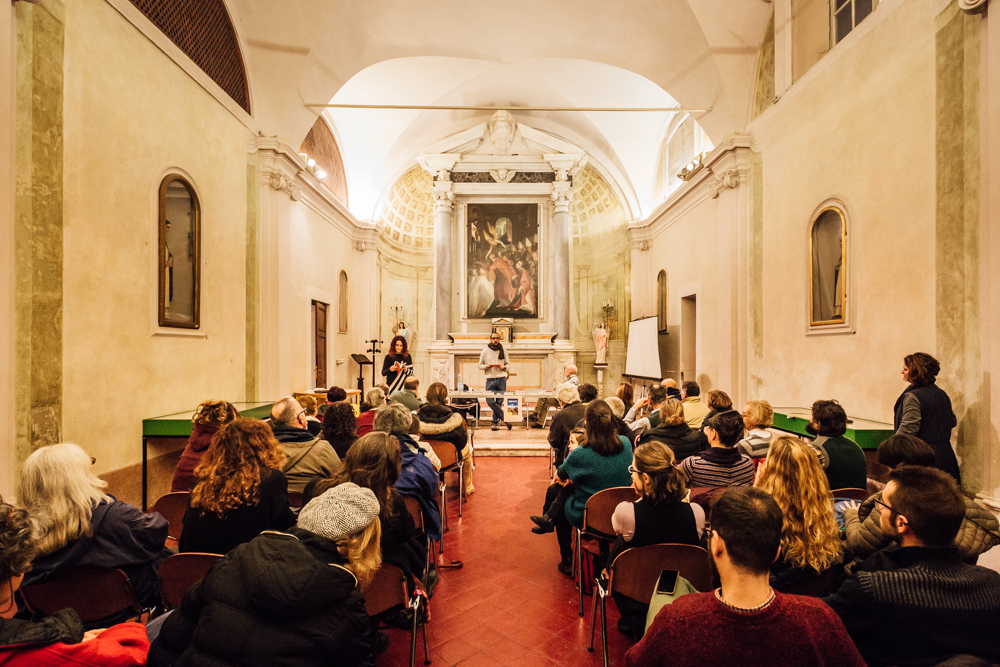
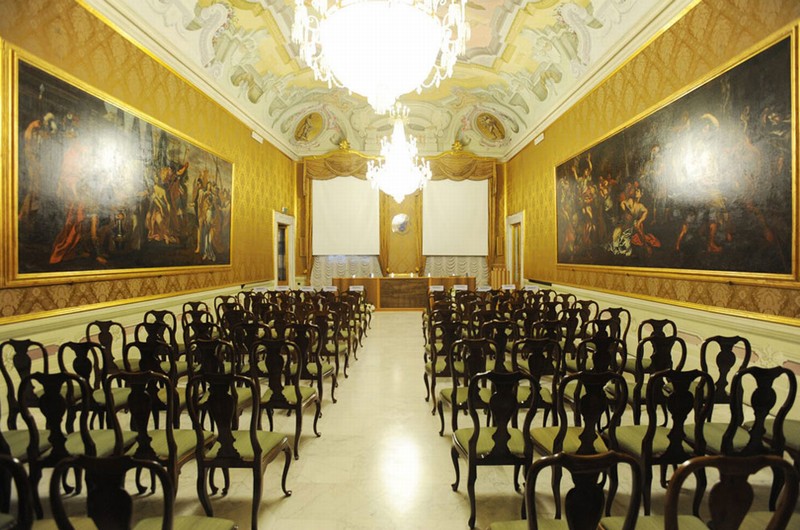
Lucca is very easy to reach both by bus as well as train from both Pisa and Florence, making it perfect for anyone getting around solely on public transportation. The train station is right outside the southern walls, with an entrance below the balcony of San Colombano that brings you right behind Lucca’s cathedral and into the heart of the small walled town. When arranging your travel by plane, book a flight to Florence (Petrola) or Pisa (Galileo Galilei) airports. The easiest way to reach Lucca is from Pisa airport that requires a 25 minutes public bus or train travel right from the airport. From Florence the travel by bus or train takes about 50 minutes. Make sure that your flight arrives earlier during the day as after 22.00 buses or trains to Lucca are no longer available. Taxis are available in Pisa airport and will cost around 50 Euro until your destination in Lucca. If your flight arrives later in the night, book a room for the night in either Florence or Pisa, and start your travel to Lucca in the morning since buses and trains are available from 5.30.
See an interactive map:
HERE
Conference participants are fully responsible for arranging the accommodation and travel to Lucca.
Conference Program
The Conference Agenda is available in the right sidebar of this page.
The extensive conference program with abstracts and available draft papers is accessible below by clicking on the panel number tabs and individual presentations.
Asking Big Questions Again: Bridging the Gap Between Critical Theory, Culture, Politics and Social Praxis
- A (Really) Big Question: Which Is The Proper Political Subject?he aim of this paper is to gain clarity (and charity) about the following controversy: Given the scenario in which a not misleading set of citizens of a territory of a sovereign state intends for the secession of the territory at stake, while the fundamental law of the state does not permit the unilateral democratic secession of any territory of the state, is it due the prominence of democracy or the prominence of law?Carles José i Mestre, Department of Philosophy, University of Barcelona, Spain
- A Brief History of the Inhumanities and Contemporary Humanities StudiesWhat is needed, then, is a supplement to the history of the humanities: contemporary humanities studies, or studies that articulate why the principles of humanistic study are preferable, in this present moment, to those of the inhumanities. This paper provides an East-West (Zhang Longxi) approach to the history of the inhumanities, and concludes with thoughts toward contemporary humanities studies.William H. Bridge, University of Rochester, USA
- Biomedical Hegemony: A Critical Perspective on the Cultural Imperialism of Modern Biomedical Perspectives on Human LifeModern biomedical perspectives are currently moving towards a cultural hegemony, granted by society at large. In Gramscis words, it is “the 'spontaneous' consent given by the great masses of the population to the general direction imposed on social life by the dominant fundamental group” – in this case medical doctors – that leads to cultural hegemony. To evaluate the legitimacy of the moral crusade of biomedical system, critical perspectives on medical dominance is needed.Olaug S. Lian, University of Tromsø / The Arctic University of Norway, Tromsø, Norway
- Autophagy: Science, Technology, Economics, Arts, MetaphorThe paper will trace how different disciplines adopt autophagy as a metaphor of positive growth or health. The disciplines then make a further metaphorical leap to scale up the processes and effects of autophagy—essentially moving from a cellular to a larger structural level—to show how each discipline is similarly beneficial in terms of “growth” or “health.”Roger Davis, Department of Humanities and Social Sciences, Red Deer College, Canada
Performing Identities: Performativity of the Body, Gender, and Sexuality and the Relationship between Identity and Performance in Performing Arts, Literature, and Social Narratives
- Performing Femininity by Building a New Corporal Prison. The Female Bodybuilding Body on StageThis paper addresses the muscular woman’s body, and if it can be considered a subversive act trying to break the patriarchal structure internalized by our society. A structure that in the sphere of passivity limits non-action, submissiveness and so on from women’s perspective. Looking for this new identity becomes a transgressive act, due to building a new body with which to be identified by stepping into a territory limited to the male.Isabel Fontbona Mola, Theories of Contemporary Art Group, Universitat de Girona, Spain
- Intervention – Working the BodyShort intervention about the discipline of working the body in female bodybuilding competitions by Isabel Fontbona Mola. With a sports career as a natural bodybuilder competitor she will illustrate the discipline of performing the sculptural body in female bodybuilding competitions.Isabel Fontbona Mola, Theories of Contemporary Art Group, Universitat de Girona, Spain
- The Body on Display: Visualizing and Constructing Criminal Identity in the Dutch RepublicMy paper examines examples of images that recorded the liminal spaces outside the city walls and considers the manner in which the criminal body came to be framed in relation to the land. In so doing, it shall interrogate the use of unsanctioned actions at the gallows as a means by which civic identity could be negotiated or transformed.Anuradha Gobin, University of Calgary, Canada
- The Fluency of ‘Self’: Classical Yoga Philosophy and Performance IdentityThrough the scope of their work, the artist-performers may assume the identity of activist, advocate, or peacemaker. The freedom to assume any given identity is facilitated through the practice of classical yoga, the intentional direction of one’s consciousness through which the experience of an ultimate identification with intrinsic Self arises.Lisa Garner Santa, Texas Tech University, Lubbock, Texas, USA
- Exoticism, Nature, and Homosexual ”Coming out”. Exile and the Establishing of New Subjectivity in the Works of Witold GombrowiczThe paper is an examination of how the experience of exile/migration was reflected in the diaries and novels of Witold Gombrowicz. I focus on two of Gombrowicz`s strategies for coming to term with the feeling of ‘being removed’ from his home country Poland (which was subjected to extremely traumatic historical oppression: Nazi terror, holocaust, Soviet deportations): a)homosexual „coming out” (in the novels „Trans-Atlantyk” and „Pornografia”) as well as b) admiring the exotic Latin American nature („Diary Rio Parana”).Aleksandra Ubertowska, University of Gdańsk, Poland
- A Satrean Account of the Role of Social Narratives in the Identity-Formation and Self-Conception of the Queer and Intersex SubjectThis paper will show the two to be inextricably interlinked, and in so doing endorse Judith Butler’s view that the material comes to us already seeped in social meaning. The interactive relationship between the discursive and the material will be illustrated by examining the phenomenon of intersexuality, in which the prevailing narrative of a dichotomized two-sex system has, through surgical, hormonal, and psychological procedures, become written into the flesh of non-binary individuals.Bianca Jewel Phillips, Rhodes University, Grahamstown, South Africa
Thinking Contemporary Culture and Education: Post-Truth, Multiculturalism, Relativism, Difference and Models of Youth Education and Integration in Contemporary Societies
- Troublemakers: The Good, the Bad, and the UglyThe basic premise of my talk is that summoning young people towards the dominant position of the “good troublemaker” is reproducing uneven symbolic and material effects in the lives of young people, and more broadly, urban life. In particular, I demonstrate how these representations of youth are key to manufacturing new urban consumer economies that traffic in the look and feel of youth, which privilege the aesthetic preferences of upwardly mobile consumers being hailed back to the city.Tyler Denmead, Faculty of Education, University of Cambridge, UK
- It’s Not Youth, It’s Us. Youth Suicides and Rosi Braidotti’s Post-human EthicsThis paper starts from the alarmingly high suicide numbers amongst the youth in current Western societies, arguing that feelings of loneliness and personal responsibility of our hyper-individualistic neoliberal societies are taking their tolls. This phenomenon sheds a worrisome light on our present-day world: if the youth doesn’t want to live in it, is there a future?Saskia Kroonenberg, Philosophy and Italian Literary Studies, University of Amsterdam, The Netherlands
- Post-Truth, Relativism and MusicIt has become common to “blame” postmodernism and post-structuralism for our new age of post-truth, alternative facts and relativism. Expertise now appears to be discredited, gut feeling at least as important as facts, and facts themselves no longer valid and reliable. But how did we really get to this point? This early-stage research project pursues the hypothesis that this development has actually been much longer in the making.Wolfgang Marx, University College Dublin, Ireland
- The Role of Critical Thinking in Multicultural Management ProgramsI will discuss problems related to teaching critical thinking in multicultural classes. Management and managers already influences Europe in almost every field of expertise and discipline. Thus, it is important critically reviewing how managers are educated. I suggest a balanced multidisciplinary approach in order to improve the level of critical thinking within management programs, finally reflecting upon whether European higher education will succeed in distributing necessary resources if to approve.Tor Erik Jensen, University College of Southeast Norway, Kongsberg, Norway
Art, History, Cultural Diplomacy and Critical Assessments of Politicized Representations of Identity in Arts
- Old Masters Exhibitions and Fascist Propaganda: Italian Masterpieces in London, Paris and Belgrade (1930-1938)This paper will investigate the Old Masters exhibitions promoted by the Fascist government during the Thirties, i.e. Italian Art 1200-1900 (London 1930), L’Art Italien de Cimabue à Tiepolo (Paris 1935) and the exhibition of Italian portraits organized in Belgrade in 1938. Italian cultural policy will be considered in relation to its dynamic alliances and rivalries, in order to shed light on the context that involved both physical and symbolical displacements of artworks for propaganda purposes.Matilde Cartolari, Technische Universitaet von Berlin, Germany
- Spitting on Incapables, Madmen, and Cheats: The NSDAP’s War on Degenerate ArtDrawing on paintings from the period 1918-1945, combined with primary source documents from various Weimar artists and their guilds, juxaposted against official documents from the NSDAP, I explain how the NSDAP used all assets of the State to use art as a vehicle to advance NSDAP propaganda for their political and military programs. My research provides critical insights into how the NSDAP used art as a tool to manufacture public support for their war effort. Furthermore, my paper explores the question how an artificial truth can become manufactured and perpetuated.Sean N. Kalic, Dept of Military History, US Army Command and General Staff College, Fort Leavenworth, USA
- Postcolonial Art and Critical Discourses at the São Paulo BiennialI am interested in looking at how the most important contemporary art event of the Global South allows us to think of new power configurations, as for instance, bringing feminist discussions and post-colonial debates to a wider audience. Furthermore, I also argue that Biennials in general contribute to the redefinition of the canon, adding diversity to the contemporary art world.Amélia Siegel Corrêa, Department of Anthropology, University of Copenhagen, Denmark
The Eurozone Crisis: Transformative Impact on the European Project and Model(s) of Capitalism
- Not So Ordoliberal after All? Public Management and the Transformation of European GovernanceBy drawing on the lineage of public management, the paper argues that we should understand the nature of Europe governance today not just as constricting national state action through the deepening of rules (as implied by ordoliberal theory), but rather the reverse: the centralisation of increasingly discretionary power away from established democratic centres and into technocratic and executive bodies.Ian Alexander Lovering, University of Sussex, UK
- Financial Crises snd Plurilateral DiscoursesThis paper analyses impacts of the Eurozone crisis on the global standing of the European Union (EU) through the failure of the EU interregional approach in the EU-ASEAN plurilateral discourse. It appropriates theoretical models of socialisation, in order to explain the dearth of cooperation in the EU-ASEAN plurilateral partnership during the Eurozone crisis.Diana Bozhilova, New College of the Humanities, London, UK
- From the SGP to the TSCG through the Lenses of European Integration TheoriesWhich were the driving forces and key actors of this deepening in economic integration? Are they found at a national or at a supranational level? These are the questions that this paper aims to answer, through the study of the strengthening of the fiscal and economic pillars of EMU. The analysis will be done through the lenses of the two grand theories of European integration: Neofunctionalism and Liberal Intergovernmentalism; as well as a more recent theory: the New Intergovernmentalism approach.Ariane Aumaitre Balado, College of Europe, Brugge, Belgium
- Challenges of Modern Extraordinary Insolvency Procedure in EuropeGiven that the nature of these companies makes them relevant on the verge of their collapse, the author focuses on the legal and economic aftermath of their failures with the case study of the European Union newest member state: Croatia. The analysis was conducted on the basis of insolvency law, with an emphasis on the legal limits of the legislator’s remedies for market imperfections.Dominik Vuletić, Faculty of Economics and Business, University of Zagreb, Croatia
- Haven of Peace and Prosperity or Neo-Nazi Nightmare? A Discourse Mythological Analysis of the AKP’s Discourse on the EUThe paper aims to analyse depictions of the EU in the discourse of the Turkish AKP government using the discourse mythological approach, developed by Kelsey (2013, 2014, 2015). This approach combines critical discourse analysis (the discourse historical approach in this case) with political mythology.Catherine MacMillan, Yeditepe University, Istanbul, Turkey
Identity and the City: Urban Transformations, Transition and Change in Urban Image Construction (Section 1)
- The Integrative Power of Non-Representationalism in Urban Spaces: Creative Collaboration and Local Identity among Immigrants and Ethnic Minorities in Brusselsy interest here is in the non-ethnically representational spectacle of cities. In other words, events that, instead of re-presenting a history of a people, culture or place, are born out of the people and culture in place today—a (temporary) contemporary expression of local diversity and local identity. Here, as in Brussels’ Zinneke Parade, the emphasis is on creating and presenting (not re-presenting) the contemporary local.Joseph M. Costanzo, Independent Researcher, Geneva, Switzerland
- The Influence of the Immigrants in Atlantic, Colombia for the History Art, the Culture and Urban Identities in the XVIII-XX CenturiesThis article provides a brief description of the historicity that presents the city of Barranquilla, taking into account the set of situations that cause the historical facts and the predominance of the settlements, customs and vicissitudes with multi - trends that have influenced the conduct of its current inhabitants, as a result of the consistency of the different preferences in all areas of human coexistence.Giovanni Polifroni Lobo, Universidad del Atlantico, Barranquilla, ColombiaDelma Esther Rocha Alvarez, Universidad del Atlantico, Barranquilla, Colombia
- Eternal Rebirth: The Difficult Development of Urban Identity Between Destruction, Reconstruction and New Formal Layouts – The Case of Argenta (Ferrara, Italy)The purpose of the paper is to draw critical assessments on regeneration and urban development phenomena that have addressed post-war reconstruction in agro-industrial contexts. In this sense, formal and identifying characteristics emerge of a community that boasts settlement continuity dating back millennia. The case study refers to the city of Argenta located in the territory of Ferrara.Enrico Pietrogrande, University of Padua, ItalyAndreina Milan, Department of Architecture, University of Bologna, Italy
Critical Contemporary Economics and Politics: From Local to Domestic and International Dimensions
- New Frontiers in Indigenous Economies: The Example of the United StatesThis paper proposes to discuss indigenous economies in the context of the United States and will attempt to provide answers to questions as to whether it is legitimate to consider indigenous minorities as different from other deprived minorities. When an Indigenous nation succeeds in creating a functional economic development, are they still considered as being different from the mainstream?Susanne Berthier Foglar, Université Grenoble Alpes, St Martin d'Hères, France
- Understanding the Trembles of Nature: How Do Disaster Experiences Shape Bank Risk Taking?This paper examines the impact of natural disaster experiences on banks’ business practices. Using earthquake and banking data for California, we find that banks that have had stronger earthquake experiences change their practices, both as a result of the natural disasters’ effects on local deposit supply and through changes in banks’ risk perceptions.Jaap W. Bos, School of Business and Economics, Maastricht University, The NetherlandsRunliang Li, School of Business and Economics, Maastricht University, The Netherlands
- Understanding the Discrepancy between Aims and Practice in International Criminal Justice: A Critical PerspectiveThis paper finds that this discrepancy between aspiration and practice does exist and seeks to understand why it occurs, identifying the influence of geopolitical factors and hegemonic intent. This analysis is undertaken through the creation and application of a methodological framework comprised of an understanding of international criminal justice as defined through a justice progression.Shannon Maree Torrens, Sydney Law School, University of Sydney, Australia
- Rethinking China’s Revolutionary Identity in Transformation: Memory, Reflection, and Cultural PoliticsTaking the memory of a former Red Guard Qian Li who committed revolutionary violence during the CR as a case, this research employs the methods of oral history and discourse analysis to examine the following issues: which traumatic memory Mr. Li has experienced and how he has witnessed the history; how he has expressed his regret and reflection on the collective violence of the Red Guards; what the meanings of the cultural politics have been constructed through the practice of memory and reflection.Mengqian Yuan, Nanjing University, ChinaChu-Jie Chen, Sun Yat-sen University, Guangzhou, China
The Sequential Arts: Comics as Critical Cultural Nexus
- Dialectograms and The Architecture of ComicsIn this paper, I will discuss how their architectural iconography behave as comics panels except in a non-linear fashion – similar to Chris Ware’s experiments in the graphic novel Building Stories (2012) or Joe Sacco’s The Great War (2014). Through this example of my own practice I will explore Scott McCloud’s argument in Understanding Comics that in comics, ‘time and space are one and the same’ (McCloud, 1993: 100). I will look at graphic narratives as a form of display that shares common traits with the logic of museums and exhibition.Mitchell Miller, Glasgow School of Art, University of Glasgow, UK
- Monstrosity, Uncanny Replication, and Family Values in Tom King’s and Gabriel Hernandez Walta’s The VisionTom King and Gabriel Hernandez Walta's 2016 twelve-issue limited series The Vision situates the Avenger’s legendary synthezoid and his family in the suburbs of Arlington, Virginia. The dissonance between this sinisterly mundane setting and the increasing fragmentation of his synthezoid children and wife - who instinctively and defensively murders a human attacker in the first issue - serves as the unsettling tempo of a graphic narrative that interrogates the representation of humanity as only sequential art can.Tiffany Hong, Department of Languages, Linguistics, & Literatures, Nazarbayev University, Astana, Kazakhstan
- Readers through Augmented SpacesBy reflecting on the reconfiguration of comics in the actual space or their combination of codex space with actual space, this paper aims to identify the movements of the reader between spaces, places, and objects as a way of connecting the spaces of discourse. This is, I will consider space not as a static device, but as an agent in which architectural structure and characteristics should be considered in their full potentialities, especially in their capacity of housing or surrounding objects and readers.Carolina Martins, FCT Programme in the Materialities of Literature University of Coimbra, Portugal
- The Insignificant GirlThis paper highlights the gender polarity and the disparity in story proportion given to the female character vis-à-vis the male. In doing so it addresses how comics were in support of all things patriarchal, and helped propagate a way of thinking that we now understand to be not just dangerous, but destructive. Finally, it considers contemporary female characters from Indian comics now and contemplates the winds of change over generations as India moves from being a ‘third world country’ to a ‘superpower’.Manasee Jog, Srishti Institute of Art, Design and Technology, Bangalore, India
Identity and the City: Urban Transformations, Transition and Change in Urban Image Construction (Section 2)
- LONELINECTED: The Progress of Isolation in a Connected WordThis paper tries to analyze the components of this reality and its possible consequences, especially the ones related to the built environment. The connection of this paradoxical phenomenon with other running paradoxes, such as global-local or democracy-autocracy and their problematic readings, will be explored. The paper concludes with a two directional reflection. From one side, the consequences that this situation could have in the built environment, and from the other, the possibilities that architecture and urbanism have for shifting this trend.Paco Mejias Villatoro, Xi'an Jiaotong-Liverpool University, Suzhou, China
- Metamorphoses in the City and the Place of Collective Memory: What Challenges?The reflection presented in this summary derives from a sociological and qualitative and ethnographic study (2015-2016) about the impacts of urban rehabilitation on local social recomposition, focusing on Rua das Flores, located in the Historic Center of Porto. The dynamics associated with the sociabilities and daily lives of local social actors are profoundly adapted, under the urban transformations and the emergence of more diverse and international publics, as well as more dispersed.Joana Ribeiro Santos, University Porto, Portugal
- Reviving Social Connectivity and Tradition in South Korea through Urban DevelopmentLe Corbusier’s proposed standardization of architecture in harmony with the economic and social aspects of urban life thus raises new questions of how the Western modernist city could be integrated with Korean vernacular architecture to encourage interactions between neighbors without the concrete walls that segregate apartments from society at large.Seung Jin Choi , Independent Researcher











